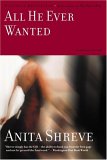Summary | Excerpt | Reading Guide | Reviews | Readalikes | Genres & Themes | Author Bio

Again, her hand was warm in my own. I could not help glancing once more at the presentation of her bosom, a lovely promontory that seemingly begged to be examined, and I wondered then (how quickly thoughts of possession cause jealousy to blossom) if some other man had once put his hand there, if, in fact, this handsome and stately creature before me had had many lovers. Perhaps this thought — and certainly my wayward glance — betrayed me, for she put a hand to the very place I studied, as if to cover herself.
And then she was gone.
I exchanged some further pleasantries with Bliss, so as not to seem rude, but it was all I could do to linger even a moment longer in that fetid greenhouse, craving as I did not only a breath of fresh air but also an opportunity to think upon the person of Etna Bliss and add to my small cache of memories, which I should continue to mine ceaselessly in her absence: a half dozen sentences, the strain of black-and-bronze silk over a bosom, and an entirely naked, if fleeting, look of fear at the prospect of imprisonment. Armed with these precious, if fragile, possessions, I then went in search of my breakfast.
The view outside my window has deteriorated from the muted blues of the Vermont hills and the navy ribbon of the Connecticut River as we make our way south from White River Junction, where I boarded the train. I have had the good fortune to secure a compartment to myself on this, the first leg of my journey; and as I shall be taking a sleeper from New York City, I have hope of remaining secluded, which is what I wished for when I made the booking. I confess that I am somewhat nervous about the prospect of a visit to southern Florida, since I have heard worrying tales of scorpions and fire ants and malaria-ridden mosquitoes, as well as the terrible heat. Accordingly, I have packed, amongst my books and papers and Etna’s tin cake box, two white linen suits, several thin cotton shirts, and a new pair of canvas shoes. My only difficulty will be my mourning clothes, which I cannot avoid, since I shall have to wear them to my sister’s funeral, the point of my journey. I had these garments taken out of storage and delivered to my tailor directly for pressing, for I could not bear to have to look at them, the clothes giving off, as they must, the scent not only of death, but also of nearly annihilating guilt — not to mention the heart’s ruin.
We are passing now the mill towns of Holyoke and Chicopee in Massachusetts, blights upon the New England landscape that, however necessary, always put me in mind of the drearier essays of Hazlitt and Carlyle. But I have found, if I narrow my eyes just so, that I can blur this geography somewhat and fix my gaze upon only those attributes of these cities that are bearable: the uneven planes of glass in the windows of the abandoned mill buildings, for example; or a polished black-and-maroon automobile parked intriguingly at the end of a deserted street; or a woman in a short skirt and kerchief fighting her way against the wind toward a church. Perhaps it is this trick of willfully blurred but occasionally keen vision, or the rocking of the moving compartment, or the comforting clacking of the train wheels upon the rails, or, more likely, the idea of a desk (a table, really), on which I have set my pen and notebook, inside a moving vehicle — the sense of one’s own library at speed — that invites me now to begin a personal narrative I have long wanted to write, but for which I have always lacked the necessary strength . . . (And in that ellipsis, I have just engaged in a lengthy debate with myself as to whether or not to reveal, with complete honesty, the events I wish to record, and I have decided that this document will be as worthless as a floating fragment of ash if I resort to fiction, even fiction by omission. So I will tell the entire truth on these pages, even if this causes me the greatest pain — and it will, it will!) . . . (Though I must add, in a further parenthesis, that I am only too aware that I can cross out offending sentences later and recopy the text and then edit the narrative should I find the resulting truth too unbearable to read. And is this not so for every story one writes or speaks in one’s lifetime? How, for example, will the death of my sister be portrayed to me when I reach my destination? Will the anecdotes of the death watch not change radically depending on the teller of the tale and on the details which have been left out, such as particular physical agonies that a daughter or a cousin might deem too unseemly to reveal?)
From All He Ever Wanted by Anita Shreve. Copyright 2003. All rights reserved. No part of this book may be reproduced in any form without written permission from the publisher, Little, Brown & Company.




Believe those who are seeking the truth. Doubt those who find it.
Click Here to find out who said this, as well as discovering other famous literary quotes!
Your guide toexceptional books
BookBrowse seeks out and recommends the best in contemporary fiction and nonfiction—books that not only engage and entertain but also deepen our understanding of ourselves and the world around us.